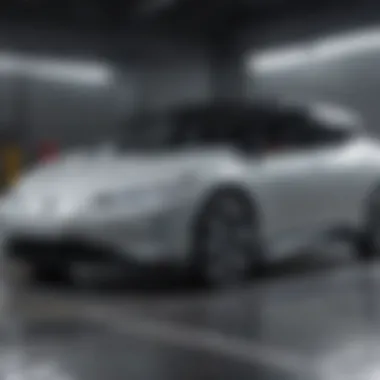Unveiling Nissan Electric Battery Technology and Future Prospects


Intro
The emergence of electric vehicles has reshaped the automotive landscape. At the forefront of this transformation is Nissan, whose electric battery systems have a significant role. This article explores Nissan's innovative advancements in battery technology. Topics include battery chemistry, production processes, performance metrics, and sustainability initiatives.
Understanding these elements is essential for automotive enthusiasts and prospective car buyers. Nissan's dedication to electric mobility is noteworthy in an industry increasingly focused on eco-friendly practices and consumer demand for sustainable solutions.
Car Reviews
Overview of the Vehicle
Nissan's electric vehicles, particularly the Leaf, exemplify a well-integrated battery system. This compact hatchback utilizes lithium-ion battery technology, which provides impressive mileage on a single charge. Additionally, Leaf models follow a progressive design philosophy, promoting aerodynamic efficiency and user functionality simultaneously.
Performance Analysis
Performance is measured in several factors. The Leaf offers torque instantaneously due to its electric motor, providing a responsive driving experience. Real-world reviews often highlight its smooth ride and low noise levels, making driving an accessible experience.
Charging capabilities provide flexibility. With home-based charging options and fast-charging facilities widely available, daily commutes and long-distance travel become hassle-free. According to testimonails, the car can reach 80% charge in about 40 minutes using quick-charging stations.
Design and Interior Features
The interior prioritizes both comfort and technology. The Leaf features user-friendly infotainment systems, a spacious seating arrangement, and eco-conscious materials. Nissan has taken strides toward modern aesthetics with simple designs and calming color choices, appealing deeply to today's consumers.
Safety Ratings and Specifications
Safety remains of utmost importance. The Leaf earns high safety ratings, bolstered by technology such as advanced driver assistance systems. Features like collision warning, emergency braking, and pedestrian detection contribute to its lower accident rates, validating Nissan's commitment to consumer safety.
Value for Money
When considering the price and features, the Leaf remains a competitive player in the electric vehicle market. With various incentives and discounts from governments, potential buyers can find the Leaf an appealing option. The cost-to-benefit ratio of ownership becomes beneficial over time with reduced fuel expenses and maintenance of electric vehicles being generally lower than traditional combustion vehicles.
Automotive Industry Trends
Emerging Technologies
Nissan continues to invest in new technology. Developments in battery chemistry ensure higher energy density and reduced charging times. Solid-state batteries are on the horizon. Once fully realized, these batteries may provide substantial advantages in capacity and safety.
Changes in Consumer Preferences
Current trends show a robust demand for electric vehicles. Consumers prioritize zero-emission disclosures. Nissan, with its offerings, aligns seamlessly with the shifting priorities of consumers keen on sustainability and low environmental impact.
Sustainability and Eco-Friendly Practices
Nissan's sustainability initiatives underline its commitment to green technology. Innovations in battery recycling aim to mitigate waste. This circular economy approach not only helps the earth but also fosters consumer loyalty to the brand by reflecting shared values.
Future of Electric Vehicles
The outlook for electric vehicles is positive. As advancements continue, the overall adoption and market penetration are expected to expand significantly. Nissan’s proactive strategies in technology and marketing benefit their stature in an evolving marketplace.
Industry Challenges and Solutions
Despite these advancements, challenges such as battery sourcing, infrastructure limitations, and consumer apprehension regarding adoption persist. Nissan actively seeks solutions, partnering with environmental organizations to ensure transparent and sustainable practices.
Culmination
Nissan's electric battery systems represent more than just technology; they embody a commitment to a sustainable future. As we have seen, through innovations in battery design and sustainability initiatives, Nissan positions itself well for ongoing success in the electric vehicle market. Understanding these technological advances is crucial for anyone considering a shift to electric mobility.
Overview of Nissan's Electric Battery Technology
Nissan's electric battery technology represents a fundamental pillar in the evolution of electric vehicles (EVs). This topic garners significant attention as we see a shift towards sustainable and efficient transportation. The variety of battery systems utilized not only drives performance but also aligns with the broader implications regarding environmental impacts and economic benefits. Understanding these technological advancements provides valuable insights into what consumers can expect, ranging from vehicle performance to longevity and pricing.


Historical Context
Nissan's journey into electric mobility dates back to the early 2000s with the development of the Nissan Leaf. As one of the first mass-produced electric vehicles, the Leaf introduced consumers to the potential of safe and efficient electric propulsion, backed by pioneering battery technology. This historical significance compounded over the years, as Nissan successfully refined its electric battery systems.
The company has focused on lithum-ion technology since the outset, an industry standard that promises efficiency and reliability. The continual investment in research gigs at Nissan has facilitated transitions through various generations of batteries. These transitions result in enhanced energy density and improved charging times, which are critical for user adoption on broader scales. Over time, the historical milestones laid the groundwork for greater electrification across the Nissan lineup.
Current Battery Models
Nissan offers several electric battery models that are designed to suit various vehicles in their EV range. The ACTION model, a notable example, equips the latest generation of Nissan Leaf whereas the AERBOR model, optimized for vehicle agility and range, caters effectively for e-NV200 models.
Key specifications of the current battery models include:
- Energy density: Increased energy content relative to the weight.
- Charging cycle life: Enhanced lifespan compared with previous versions, substantiating longevity in daily usage.
- Environmental performance: Comprehensive strategies for incorporating recycled materials in future models.
Through understanding these prominent battery technologies and their facilitating structures, Nissan seeks to create a seamless integration of electric battery technology and user requirements, thus strengthening their competitive position in the designers’ vehicle production.
Investing in battery innovations is integral to transforming Nissan's approach to both scalability and eco-friendliness in electric mobility.
Whether for prospective buyers or enthusiasts, the exploration of Nissan's battery technology is vital to comprehending its impact within the broader electric vehicle spectrum. This examination highlights both historical importance and progressive advancements that benefit consumers today.
Battery Chemistry: An Examination
Battery chemistry is a critical focal point in understanding electric vehicle performance and the trajectories of future advancements. For Nissan, the selection of battery components influences not only the efficiency and range of their electric vehicles but also impacts the larger narrative surrounding sustainability and technological innovation. It is significant to analyze the various chemistries involved, mainly Lithium-ion and emerging solid-state technologies. Each has implications for the viability and user acceptance of electric vehicles.
Lithium-ion vs.
Solid-State
Lithium-ion batteries serve as the cornerstone of current electric vehicle technology. They involve lithium compounds often combined with other materials such as cobalt and nickel to enhance stability and energy density. Nearly all of Nissan's present electric models utilize this battery type. The advantages of Lithium-ion include:
- High energy density
- Relatively low weight
- Good cycle life
However, there are drawbacks too. Safety concerns around dendrite formation, and thermal runaway can complicate mass manufacturer of these batterys. Another emerging variant, solid-state batteries, present potential breakthroughs in several areas. Solid-state batteries replace the liquid electrolyte used in Lithium-ion batteries with a solid counterpart. The benefits encompass:
- Higher energy density
- Improved safety by eliminating flammable liquids
- Faster charging abilities
These innovations could fundamentally alter how Nissan designs their electric vehicles in the near future.
Performance Characteristics
When discussing battery chemistry, performance metrics cannot be overlooked. Factors such as energy density, cycle life, and charge time directly affect user experience and satisfaction.
For Nissan's Lithium-ion cells, energy density typically hovers around 150-250 Wh/kg. This number underscores the need for ongoing research and scalability efforts to advance further. It ensures that cars provide ample range while being lightweight.
Charging times differ significantly based on battery chemistry. Current Lithium-ion models may take hours for full-charge but enhancements in fast-charging technology are being implemented. Solid-state batteries can compress this time significantly. Reducing the charging duration grows essential, as consumers look for convenience in their travel experience.
Moreover, Nissan focuses on improving thermal management in their vehicles, which is crucial for battery longevity and safety across various driving conditions. These performance characteristics shape the perceptions and overall trust of consumers as they evaluate Nissan’s offerings amid an array of competitor technologies.|
Battery chemistry massively informs how appealing a vehicle is to prospective buyers.
Production Processes and Innovations
Understanding the production processes and innovations in Nissan's battery technology is essential for comprehending how the company maintains its competitive edge in the electric vehicle (EV) market. Nissan's approach towards manufacturing its electric batteries is increasingly vital due to the growing demand for efficient and reliable EVs. This section discusses various manufacturing techniques, along with comprehensive quality control measures that ensure the integrity and performance of the batteries.
Manufacturing Techniques
Nissan employs advanced broad-spectrum manufacturing techniques to develop its electric batteries. The use of specialized machinery and automated production lines allows for high precision and efficiency. Critical aspects of these techniques include:
- Automation: The factory environment incorporates robotics for repetitive tasks, ensuring consistency and reducing human error. This not only speeds up production but also enhances the quality of the final product by minimizing defects.
- Resource Efficiency: By optimizing material usage and minimizing waste throughout manufacturing, Nissan strives to reduce its environmental footprint. The implementation of closed-loop systems allows for recycling of materials back into the production line.
- Cell Design Innovations: Ongoing research into better battery cell architecture, including the arrangement of electrode materials, costs and performance optimizations lead to enhanced energy density.


Additionally, Nissan is focused on improving the manufacturing process to facilitate future Evolutions in battery technology. This commitment is reflected in various partnerships for joint resarch and development.
Quality Control Measures
Quality control remains a cornerstone of Nissan's battery production strategy. Ensuring that every battery meets stringent performance and safety guidelines is non-negotiable as battery failures can have severe repercussions. Key elements of Nissan's quality control measures include:
- Rigorous Testing: All batteries undergo extensive tests during and after the manufacturing process. These tests assess various performance factors, including energy capacity, charge retention, and thermal management.
- Benchmarking Standards: Nissan sets rigorous industry standards benchmarked against global best practices. Adherence to these standards ensures reliability and longevity in its products, which strengthens consumer trust.
- Continuous Feedback Loops: By actively engaging in data analysis, Nissan uses insights gained from field data to identify potential improvements in manufacturing techniques. This dynamic approach allows for real-time adjustments and innovations, driving improved performance for future models.
These meticulous quality control measures foster confidence in Nissan's electric batteries among consumers. A strong reputation is extremely important given the potential hazards associated with poorly manufactured batteries.
In summary, Nissan's advancements in production processes and quality control are not merely technicalities; they are fundamental to the essence of Nissan's electric vehicle strategy. Managed effectively, these measures continue to shape Nissan's offerings in a rapidly changing marketplace.
Impact of Battery Technology on Electric Vehicle Performance
Nissan's advancements in battery technology significantly affect electric vehicle performance. Understanding these effects is vital for stakeholders, including consumers, manufacturers, and environmental proponents. The primary considerations involve the range, charging efficiency, and the supporting infrastructure necessary to maximize user experience.
Range and Efficiency
The importance of range cannot be overstated in the context of electric vehicles (EVs). An electric vehicle’s range determines how far it can travel on a single charge. Nissan has made notable strides in optimizing its electric battery systems to extend range.
- Battery Density: Higher energy density in the battery translates to more usable power without increasing volume or weight. This improvement is essential for maximizing the distance an EV can cover.
- Software Optimization: Nissan continually updates its energy management systems. These updates analyze driving patterns and adapt battery usage, boosting efficiency in real time.
- Regenerative Braking: This technology allows the vehicle to recover some energy during braking. The captured energy is stored, contributing back to the overall range.
Increasing efficiency also affects how drivers perceive convenience. Greater energy performance results in lower operating costs. Consumers benefit from longer trips between charges and reduced reliance on chargers.
A noteworthy claim by Nissan states that its recent models can offer a range exceeding 250 miles on a single charge under normal driving conditions.
Charging Time and Infrastructure
The answer to how long does it take to charge an EV can influence buyers' decisions strongly. Nissan has highlighted the role of charging infrastructure within its operational vision.
- Fast Charging: Nissan has defined parameters for charging its vehicles quickly. With DC fast charging stations, consumers can power up their cars considerably in fewer than 60 minutes. High-voltage systems reduce downtime.
- Home Charging Solutions: Understanding that many users rely on home installations, Nissan offers simplified home charging systems. These units can often fill a vehicle from zero to full over night, providing peace of mind.
- Public Charging Stations: Nissan collaborates with various organizations to expand charging infrastructure nationally. This focus fosters reliability for traveling the distances consumers now desire.
Overall, improvements in charging processes are equally important for successful vehicle performance. As convenience increases, so does consumer satisfaction.
In summary, Nissan's work to develop battery technology supports enhanced performance metrics that appeal to a performance-oriented market. With innovations in range and charging convenience as the primary development axis, Nissan ensures its vehicles remain competitive.
Nissan's Sustainability Initiatives
Nissan recognizes that sustainability is essential for the future of electric vehicles. Their initiatives reflect a commitment to developing a more environmentally friendly automotive industry. By focusing on various sustainability practices, Nissan aims not only to reduce the impact of their operations but also to give consumers vehicles that align with their values.
Recycling and Lifecycle Management
Nissan's approach to recycling is comprehensive, focusing on both the production and disposal of electric batteries. They implement a closed-loop system that ensures materials are reused and recycled. This promotes resource conservation and minimizes waste. The lifecycle management of batteries is critical, emphasizing the importance of maximizing each battery's lifespan through efficient recycling processes.
Some key points include:
- Recovery of Materials: The recycling process targets valuable materials like lithium, cobalt, and nickel, lowering the demand for new resources.
- Second Life Applications: Batteries can be repurposed in various applications, extending their useful life beyond automotive use, such as energy storage systems.
- Collaboration with Stakeholders: Nissan works with recycling partners and authorities to establish efficient networks for battery recovery.
Through these initiatives, Nissan enhances sustainability while benefiting consumers who care about environmental issues.
Reduction of Carbon Footprint
The reduction of carbon footprint is another significant aspect of Nissan's sustainability initiatives. Electric vehicles generally produce fewer emissions than gasoline-powered cars. However, Nissan goes further by ensuring that their production processes contribute to this reduction.
Reducing carbon emissions can be accomplished by:
- Sourcing Renewable Energy: Using renewable energy in manufacturing plants, Nissan decreases the total emissions of their battery production process.
- Efficient Logistics: The company examines transportation methods and supply chain logistics to lower fuel consumption and associated emissions.
- Support for Green Technology: Beyond vehicles, Nissan invests in innovative technologies that lower the emissions associated with energy generation and usage.
“Ensuring that we reduce our carbon footprint at every stage—from production to end-of-life—is vital for the sustainability of our brand.”


Collectively, these initiatives not only demonstrate Nissan's dedication to sustainability. They resonate with consumers who want to make environmentally conscious choices when purchasing vehicles.
Competitive Landscape in the Electric Battery Market
In the rapidly evolving automotive landscape, understanding the competitive dynamics of the electric battery market is essential for comprehending Nissan's position. As electric vehicles gain prominence, battery technology plays a pivotal role in determining performance, efficiency, and consumer adoption. This section delves into the forces at play in the electric battery market, growing competition, and innovation, highlighting the significant factors influencing Nissan's strategy and operations in this space.
Key Competitors and Their Innovations
In the electric battery sector, several companies vie for leadership and innovation. Competitors such as Tesla, LG Chem, and Panasonic continuously disrupt the market, pioneering new advancements in battery technologies and manufacturing processes. Their pursuits shape the landscape by challenging established companies like Nissan.
Key areas of innovation include:
- Battery Chemistry Improvements: Companies focus on enhancing lithium-ion technology or exploring solid-state alternatives.
- Capacity and Efficiency Metrics: Innovations that increase energy density offer longer ranges for electric vehicles.
- Sustainability Practices: Many brands intensify their efforts toward eco-friendly battery disposal and recycling. Being proactive in this aspect resonates strongly with environmentally-conscious consumers.
As a result, each innovative step by competitors not only pushes the boundaries of battery technology but sets benchmarks that Nissan and others must meet or exceed.
Nissan's Unique Selling Propositions
Nissan differentiates itself in the electric battery market through unique selling propositions that emphasize reliability and consumer satisfaction. This includes:
- Technology Advances: Nissan has invested significantly in enhancing its lithium-ion battery technology, specifically its capabilities for power output and lifespan.
- Market Accessibility: With vehicles like the Nissan Leaf, the company targets a broader audience, providing more affordable options without compromising on efficiency.
- Integrated Energy Management Systems: Innovatively designed energy management solutions lead to improved efficiency in battery and vehicle performance.
- Sustainability Commitment: Nissan actively promotes its endeavors in sustainability, focusing on recycling initiatives and the reduction of the overall environmental impact.
By aligning their strategies with these propositions, Nissan stands out in an ever-crowded marketplace, providing clear advantages for consumers facing numerous choices in the electric vehicle space.
Future Trends in Electric Battery Development
The landscape of electric battery development is crucial for the future of the automotive industry. As countries worldwide intensify efforts to increase the adoption of electric vehicles, advancements in battery technology are key factors that will influence consumer choices and market dynamics. This section will explore emerging technologies that promise to enhance battery performance and address pressing challenges such as energy density, charging times, and resource sustainability. Additionally, market predictions will help to contextualize how these developments could shape the electric vehicle market.
Emerging Technologies
New technologies in electric batteries continue to evolve at a rapid pace. Innovations are not limited to enhancing existing lithium-ion technology. Here are some notable developing areas:
- Solid-State Batteries: Unlike traditional batteries, solid-state versions utilize a solid electrolyte, allowing for higher energy density and safety. This could drastically reduce fire hazards associated with lithium-ion batteries while improving performance.
- Lithium-Sulfur Batteries: These batteries could offer five times the energy capacity of current lithium-ion configurations. The key challenge remains their lifecycle and efficiency, but new chemistries present promising solutions.
- Graphene Batteries: Incorporating graphene materials could revolutionize battery construction with enhancements in heat management and load capacities, thus improving charging speeds and extending longevity.
- Battery Management Systems (BMS): These software solutions are evolving to optimize charge cycles and reduce degradation rates, thereby extending battery life. Advanced algorithms play a central role in enhancing performance.
Emerging technologies like these represent worthwhile investigations for Nissan's rebound and competitive edge in the electric vehicle market.
Market Predictions
The electric vehicle market is increasingly adaptive to changes in technology and consumer demands. Analyzing market predictions offers insights into future trends:
- Continuous growth is anticipated. The electric vehicle sector is predicted to grow substantially, reaching around 10-20 million units sold annually by 2025.
- Price reduction and increased affordability will likely accompany advancements in battery technology, which benefits the average customer.
- Environmental regulations will compel manufacturers to innovate and meet sustainability guidelines. As a leader, Nissan must align its vehicle offerings with these public policies to maintain its edge.
- Charge infrastructure will expand. Growing networks across urban and rural regions will coincide with the fullness of electric vehicles.
Optimizations in battery capacitys and market conditions suggest that now is a pivotal time not just for investors but also for potentials buyers of electric vehicles.
"The trajectory of battery innovation is driving the electric vehicle market into a sustainable future, meeting both consumer demands and environmental imperatives."
Finale and Implications for Consumers
The conclusion of this article serves as a vital recap of the pivotal points discussed regarding Nissan's electric battery technology. By incorporating insights on the evolution of their systems, improvements in performance, and sustainability practices, consumers gain a comprehensive understanding of what this means for them in the context of the growing electric vehicle market.
Summary of Findings
Through this examination, several key findings emerge concerning Nissan's electric battery technology.
- Historical Development: Nissan has evolved its battery technology significantly over the years. From early models to the current state, they have adapted to give better performance and longevity.
- Battery Chemistry and Performance: The transition from traditional lithium-ion to more advanced solutions provides enhanced vehicle performance. Solid-state innovations look particularly promising for future applications.
- Efficiency and Infrastructure: The fast charge times and long-range capacities of Nissan batteries present substantial benefits for everyday users. Reduced charging times improve the overall experience of owning an electric vehicle.
- Sustainability Practices: Their emphasis on recycling and reducing carbon footprints not only contributes positively to ecological efforts but can also affect the consumer’s purchase decisions.
- Competitive Positioning: Understanding the competitive landscape gives insight into why certain choices may favor Nissan over other manufacturers based on innovation and reliability.
“The landscape of electric batteries is continuously evolving, and understanding these nuances is crucial for consumers making informed decisions.”
Recommendations for Potential Buyers
As more electric vehicles crowd the market, prospective buyers should take a closer look at Nissan’s offerings. Here are specific recommendations to consider:
- Assess requirements for range, charging times, and overall performance capabilities Compare different battery capacities and their implications for daily use.
- Investigate Nissan's warranty policies on their batteries since longer warranty periods can signify greater reliability and confidence in the product.
- Consider Nissan’s sustainability initiatives when deliberating your purchase, as many consumers are increasingly prioritizing eco-friendly practices in their buying decisions.
- Stay updated with future developments of Nissan's electric batteries. Emerging technologies may offer advantages such as better stability, enhanced performance, and increased efficiency.
By synthesizing these findings and recommendations, this article aims to arm potential car buyers with necessary insights as they navigate an increasingly complex market landscape. Whether consumers prioritize performance, sustainability, or competitive pricing, Nissan presents a robust option worthy of consideration.







